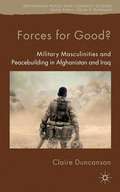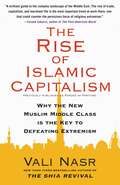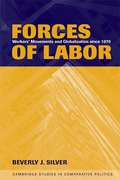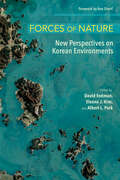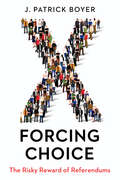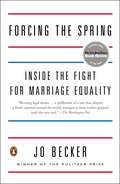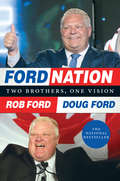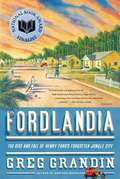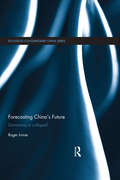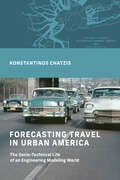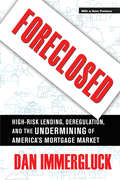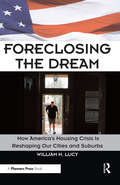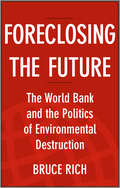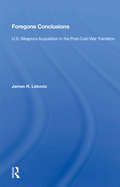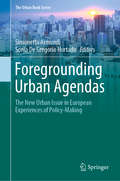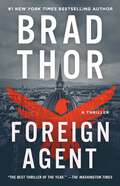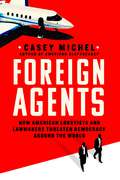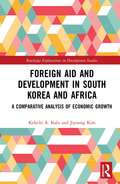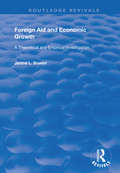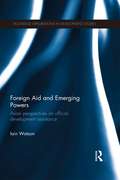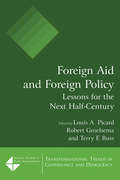- Table View
- List View
Forces for Good?
by Claire DuncansonThis book utilises the growing phenomenon of British soldier narratives from Iraq and Afghanistan to explore how British soldiers make sense of their role on these complex, multi-dimensional operations. It aims to intervene in the debates within critical feminist scholarship over whether soldiers can ever be agents of peace.
Forces of Fortune: The Rise of the New Muslim Middle Class and What It Will Mean for Our World
by Vali NasrFrom a "New York Times"-bestselling author comes a paradigm-changing revelation of the misunderstood rising force in the Islamic world--a non-extremist new middle class--that holds the key to winning the new Cold War against Iran and extremists.
Forces of Labor: Workers' Movements and Globalization Since 1870 (Cambridge Studies in Comparative Politics)
by Beverly J. SilverRecasting labor studies in a long-term and global framework, the book draws on a major new database on world labor unrest to show how local labor movements have been related to world-scale political, economic, and social processes since the late nineteenth century. Through an in-depth empirical analysis of select global industries, the book demonstrates how the main locations of labor unrest have shifted from country to country together with shifts in the geographical location of production. It shows how the main sites of labor unrest have shifted over time together with the rise or decline of new leading sectors of capitalist development and demonstrates that labor movements have been deeply embedded (as both cause and effect) in world political dynamics. ,p>Over the history of the modern labor movement, the book isolates what is truly novel about the contemporary global crisis of labor movements. Arguing against the view that this is a terminal crisis, the book concludes by exploring the likely forms that emergent labor movements will take in the twenty-first century.
Forces of Nature: New Perspectives on Korean Environments (The Environments of East Asia)
by David Fedman, Eleana J. Kim, and Albert L. ParkBringing together a multidisciplinary conversation about the entanglement of nature and society in the Korean peninsula, Forces of Nature aims to define and develop the field of the Korean environmental humanities. At its core, the volume works to foreground non-human agents that have long been marginalized in Korean studies, placing flora, fauna, mineral deposits, and climatic conditions that have hitherto been confined to footnotes front and center. In the process, the authors blaze new trails through Korea's social and physical landscapes.What emerges is a deeper appreciation of the environmental conflicts that have animated life in Korea. The authors show how natural processes have continually shaped the course of events on the peninsula—how floods, droughts, famines, fires, and pests have inexorably impinged on human affairs—and how different forces have been mobilized by the state to variously, control, extract, modernize, and showcase the Korean landscape. Forces of Nature suggestively reveals Korea's physical landscape to be not so much a passive context to Korea's history, but an active agent in its transformation and reinvention across centuries.This book is freely available in an open access edition through the generous support of the Henry Luce Foundation.
Forces of Order: Policing Modern Japan
by David H. BayleyPolice behavior in Japan and the United States
Forcing Choice: The Risky Reward of Referendums
by J. Patrick BoyerCanadians answered “Yes” or “No” to prohibiting alcohol, conscripting soldiers, and revamping our constitution. Forcing such crucial choices at the ballot box is high-stakes democracy, both here and overseas — as witnessed with Britain’s transformative 2016 “Brexit” referendum. Forcing Choice dissects Canada’s extensive use of ballot questions at all levels of government, and weighs the benefits of citizens making fundamental decisions for the nation. Holding referendums is tricky, and getting it wrong carries a high price. This hard-hitting book draws on Boyer’s deep research on direct democracy and his experience advising governments about referendums, writing books, drafting and introducing the Canada Referendum Act, monitoring foreign referendums, and campaigning in Canadian ones.
Forcing the Spring
by Jo Becker*A New York Times Notable Book of the Year** A Washington Post Best Book of the Year (Nonfiction)** A Kirkus Best Book of the Year*"[A] riveting legal drama, a snapshot in time, when the gay rights movement altered course and public opinion shifted with the speed of a bullet train... Becker's most remarkable accomplishment is to weave a spellbinder of a tale that, despite a finale reported around the world, manages to keep readers gripped until the very end." --The Washington Post A tour de force of groundbreaking reportage by Pulitzer Prize-winning journalist Jo Becker, Forcing the Spring is the definitive account of five remarkable years in American civil rights history: when the United States experienced a tectonic shift on the issue of marriage equality. Beginning with the historical legal challenge of California's ban on same-sex marriage, Becker expands the scope to encompass all aspects of this momentous struggle, offering a gripping behind-the-scenes narrative told with the lightning pace of the greatest legal thrillers. For nearly five years, Becker was given free rein in the legal and political war rooms where the strategy of marriage equality was plotted. She takes us inside the remarkable campaign that rebranded a movement; into the Oval Office where the president and his advisors debated how to respond to a fast-changing political landscape; into the chambers of the federal judges who decided that today's bans on same-sex marriage were no more constitutional than the previous century's bans on interracial marriage; and into the mindsets of the Supreme Court judges who decided the California case and will likely soon decide the issue for the country at large. From the state-by state efforts to win marriage equality at the ballot box to the landmark Supreme Court case that struck down a law that banned legally married gay and lesbian couples from receiving federal benefits, Becker weaves together the political and legal forces that reshaped a nation. Forcing the Spring begins with California's controversial ballot initiative Proposition 8, which banned gay men and lesbians from marrying the person they loved. This electoral defeat galvanized an improbable alliance of opponents to the ban, with political operatives and Hollywood royalty enlisting attorneys Ted Olson and David Boies--the opposing counsels in the Supreme Court's Bush v. Gore case--to join together in a unique bipartisan challenge to the political status quo. Despite stiff initial opposition from the gay rights establishment, the case against Proposition 8 would ultimately force the issue of marriage equality all the way to the Supreme Court, transforming same-sex marriage from a partisan issue into a modern crisis of civil rights. Based on singular access to the internal workings of this momentous trial--and enlivened by original interviews with the participants on both sides of the case, many speaking for the first time--Forcing the Spring is at once an emotion-packed tale of love and determination as well as an eye-opening examination of an evidentiary record that federal courts across the nation are now relying on to strike down bans similar to California's. Shuttling between the twin American power centers of Hollywood and Washington--and based on access to all the key players in the Justice Department and the White House--Becker offers insider coverage on the true story of how President Obama "evolved" to embrace marriage equality, his surprising role in the Supreme Court battle, and the unexpected way the controversial issue played in the 2012 elections. What starts out as a tale of an epic legal battle grows into the story of the evolution of a country, a testament and old-fashioned storytelling to move public opinion. Becker shows how the country reexamined its opinions on same-sex marriage, an issue that raced along with a snowballing velocity which astounded veteran political operatives, as public opinion on same-sex marriage flipped and elected officials repositioned themselves to adjust to a dramatically changed environment. Forcin...
Forcing the Spring: Inside the Fight for Marriage Equality
by Jo BeckerA tour de force of groundbreaking reportage by Pulitzer Prize-winning journalist Jo Becker, Forcing the Spring is the definitive account of five remarkable years in American civil rights history: when the United States experienced a tectonic shift on the issue of marriage equality. Beginning with the historical legal challenge of California's ban on same-sex marriage, Becker expands the scope to encompass all aspects of this momentous struggle, offering a gripping behind-the-scenes narrative told with the lightning pace of the greatest legal thrillers.<P> For nearly five years, Becker was given free rein in the legal and political war rooms where the strategy of marriage equality was plotted. She takes us inside the remarkable campaign that rebranded a movement; into the Oval Office where the president and his advisors debated how to respond to a fast-changing political landscape; into the chambers of the federal judges who decided that today's bans on same-sex marriage were no more constitutional than the previous century's bans on interracial marriage; and into the mindsets of the Supreme Court judges who decided the California case and will likely soon decide the issue for the country at large. From the state-by state efforts to win marriage equality at the ballot box to the landmark Supreme Court case that struck down a law that banned legally married gay and lesbian couples from receiving federal benefits, Becker weaves together the political and legal forces that reshaped a nation.<P> Forcing the Spring begins with California's controversial ballot initiative Proposition 8, which banned gay men and lesbians from marrying the person they loved. This electoral defeat galvanized an improbable alliance of opponents to the ban, with political operatives and Hollywood royalty enlisting attorneys Ted Olson and David Boies--the opposing counsels in the Supreme Court's Bush v. Gore case--to join together in a unique bipartisan challenge to the political status quo. Despite stiff initial opposition from the gay rights establishment, the case against Proposition 8 would ultimately force the issue of marriage equality all the way to the Supreme Court, transforming same-sex marriage from a partisan issue into a modern crisis of civil rights. Based on singular access to the internal workings of this momentous trial--and enlivened by original interviews with the participants on both sides of the case, many speaking for the first time--Forcing the Spring is at once an emotion-packed tale of love and determination as well as an eye-opening examination of an evidentiary record that federal courts across the nation are now relying on to strike down bans similar to California's.<P> Shuttling between the twin American power centers of Hollywood and Washington--and based on access to all the key players in the Justice Department and the White House--Becker offers insider coverage on the true story of how President Obama "evolved" to embrace marriage equality, his surprising role in the Supreme Court battle, and the unexpected way the controversial issue played in the 2012 elections.<P> What starts out as a tale of an epic legal battle grows into the story of the evolution of a country, a testament and old-fashioned storytelling to move public opinion. Becker shows how the country reexamined its opinions on same-sex marriage, an issue that raced along with a snowballing velocity which astounded veteran political operatives, as public opinion on same-sex marriage flipped and elected officials repositioned themselves to adjust to a dramatically changed environment. Forcing the Spring is the ringside account of this unprecedented change, the fastest shift in public opinion ever seen in ...
Ford Nation: Two Brothers, One Vision
by Rob Ford Doug FordDuring his tumultuous term as mayor of Toronto, Rob Ford always stayed on message—saving taxpayers money and putting the brakes on the “gravy train” at city hall. He also returned every phone call, even showing up on people’s doorsteps late at night to help them with their problems. But despite his hard work to cut excessive spending and to address the city’s crumbling infrastructure, the media delighted in showcasing Ford’s most personal struggles instead. Reporters followed him to his car, onto his front lawn, and trailed behind while he trick-or-treated with his children. The city, the country, the entire world watched Rob Ford battle substance abuse, but they rarely saw or heard the real story behind Ford—the family man, the faithful public servant, the devoted husband, father, and brother who put the people of his city above all else.In Ford Nation, Doug Ford, Rob’s brother and most trusted advisor, shares the true story of the two brothers and the Ford family: from the early days of their parents’ marriage, as Diane and Doug Sr worked tirelessly to get their company, Deco Labels and Tags, off the ground; to the Etobicoke house filled with the Ford children; to Doug Sr’s entry into provincial politics, with Rob and Doug following in his footsteps, to city hall. Ford Nation recounts the triumphs and strug-gles of Rob and Doug in their own voices—as well as the voices of their mother, Diane, nephew Michael, Rob’s widow, Renata, and daughter, Stephanie—from knocking on doors as new candidates to knocking out opponents in council chamber debates.When Rob was forced to end his campaign to remain mayor of Toronto, Doug didn’t hesitate to jump into the race, and despite his very late start he almost pulled off an upset. Doug shares what life was like for the family during this difficult time, and what it was like in the final hour of Rob’s life, when he succumbed to cancer and became, in his daughter Stephanie’s words, “the mayor of heaven.”Drawing on a number of sources to share Rob’s life in his own words after he became too ill to continue working on the book, Ford Nation is the only book that accurately captures the entire account of Rob and Doug Ford and their fight to protect the rights of the little guy.
Fordlandia: The Rise and Fall of Henry Ford's Forgotten Jungle City
by Greg GrandinThe stunning, never before told story of the quixotic attempt to recreate small-town America in the heart of the Amazon In 1927, Henry Ford, the richest man in the world, bought a tract of land twice the size of Delaware in the Brazilian Amazon. His intention was to grow rubber, but the project rapidly evolved into a more ambitious bid to export America itself, along with its golf courses, ice-cream shops, bandstands, indoor plumbing, and Model Ts rolling down broad streets. Fordlandia, as the settlement was called, quickly became the site of an epic clash. On one side was the car magnate, lean, austere, the man who reduced industrial production to its simplest motions; on the other, the Amazon, lush, extravagant, the most complex ecological system on the planet. Ford's early success in imposing time clocks and square dances on the jungle soon collapsed, as indigenous workers, rejecting his midwestern Puritanism, turned the place into a ribald tropical boomtown. Fordlandia's eventual demise as a rubber plantation foreshadowed the practices that today are laying waste to the rain forest. More than a parable of one man's arrogant attempt to force his will on the natural world,Fordlandia depicts a desperate quest to salvage the bygone America that the Ford factory system did much to dispatch. As Greg Grandin shows in this gripping and mordantly observed history, Ford's great delusion was not that the Amazon could be tamed but that the forces of capitalism, once released, might yet be contained.
Forecasting China's Future: Dominance or Collapse? (Routledge Contemporary China Series)
by Roger IrvineChina’s future development is likely to have a huge impact on twenty-first century global outcomes. It is therefore surprising that, thus far, so little attention has been given to comparing and evaluating expert forecasts of China’s future in the post-Mao era. This book presents an illuminating and comprehensive summary record of contrasting and competing expert forecasts and judgements about the major issues confronting China within four principal domains – political, economic, environmental, and international. After considering the principal forecasting methods available to experts, the author comments critically on the degree of success achieved in using those methods and emphasises the confusion created by the polarisation of opinion and by the failure of many experts to accept the high degree of uncertainty that characterises most of the key issues. The book recommends a new approach based on the study of a hierarchy of critical uncertainties and on continuing analysis of opposing expert opinions about these uncertainties. It emphasises the potential for both positive and negative outcomes for these critical uncertainties, and the importance of maximising the potential for positive outcomes through improved analytical and policy frameworks. Providing insights for specialists and non-specialists into the most critical issues that will determine China’s future direction, this book will be of particular interest to students and scholars of political, economic, environmental, and international relations issues in China and Asia, as well as to readers in business and government.
Forecasting Travel in Urban America: The Socio-Technical Life of an Engineering Modeling World
by Konstantinos ChatzisA history of urban travel demand modeling (UTDM) and its enormous influence on American life from the 1920s to the present.For better and worse, the automobile has been an integral part of the American way of life for decades. Its ascendance would have been far less spectacular, however, had engineers and planners not devised urban travel demand modeling (UTDM). This book tells the story of this irreplaceable engineering tool that has helped cities accommodate continuous rise in traffic from the 1950s on. Beginning with UTDM&’s origins as a method to help plan new infrastructure, Konstantinos Chatzis follows its trajectory through new generations of models that helped make optimal use of existing capacity and examines related policy instruments, including the recent use of intelligent transportation systems.Chatzis investigates these models as evolving entities involving humans and nonhumans that were shaped through a specific production process. In surveying the various generations of UTDM, he delves into various means of production (from tabulating machines to software packages) and travel survey methods (from personal interviews to GPS tracking devices and smartphones) used to obtain critical information. He also looks at the individuals who have collectively built a distinct UTDM social world by displaying specialized knowledge, developing specific skills, and performing various tasks and functions, and by communicating, interacting, and even competing with one another.Original and refreshingly accessible, Forecasting Travel in Urban America offers the first detailed history behind the thinkers and processes that impact the lives of millions of city dwellers every day.
Foreclosed: High-Risk Lending, Deregulation, and the Undermining of America's Mortgage Market
by Dan ImmergluckIn 2007 and 2008, the United States has observed, with some horror, the explosion and collapse of entire segments of the housing market, especially those driven by subprime and alternative or "exotic" home mortgage lending. Foreclosed explains the rise of high-risk lending and why these newer types of loans-and their associated regulatory infrastructure-failed in substantial ways. Dan Immergluck narrates the boom in subprime and exotic loans, recounting how financial innovations and deregulation facilitated excessive risk-taking, and how these loans have harmed different populations and communities.Immergluck, who has been working, researching, and writing on issues tied to housing finance and neighborhood change for almost twenty years, has an intimate knowledge of the promotion of homeownership and the history of mortgages in the United States. The changes to the mortgage market over the past fifteen years-including the securitization of mortgages and the failure of regulators to maintain control over a much riskier array of mortgage products-led, he finds, inexorably to the current crisis.After describing the development of generally stable and risk-limiting mortgage markets throughout much of the twentieth century, Foreclosed details how federal policy-makers failed to regulate the new high-risk lending markets that arose in the late 1990s and early 2000s. The book also examines federal, state, and local efforts to deal with the mortgage and foreclosure crisis of 2007 and 2008. Immergluck draws upon his wealth of experience to provide an overarching set of principles and a detailed set of policy recommendations for "righting the ship" of U.S. housing finance in ways that will promote affordable yet sustainable homeownership as an option for a broad set of households and communities. The 2011 edition features a new preface by the author addressing the ongoing global economic crisis and the impact of U.S. financial reform efforts on the mortgage system.
Foreclosing the Dream: How America's Housing Crisis is Reshaping our Cities and Suburbs
by William LucyThat America entered a profound housing crisis in 2008 is well known. The wave of foreclosures that began to sweep the nation has had radical economic effects. But the force, ramifications, and implications for communities across America have never been spelled out as clearly and thoroughly as they are in this volume. As he did in Tomorrow's Cities, Tomorrow's Suburbs, the author has taken a clear-eyed and meticulous look at the latest data and found lessons that the mainstream discussion has overlooked - particularly with regard to the spatial and demographic implications of the housing crisis. The housing market did not collapse uniformly, and the pain has not been felt equally in all age groups. Planners, public officials, activists, students, and others will benefit from the author's's analysis of the real shape of the crisis, for what happens next will reflect these inequities. The author pulls no punches in this taut, readable assessment of what the crisis will mean for the shapes of our exurbs, older suburbs, and central cities.
Foreclosing the Future
by Bruce RichWorld Bank President Jim Yong Kim has vowed that his institution will fight poverty and climate change, a claim that World Bank presidents have made for two decades. But if worldwide protests and reams of damning internal reports are any indication, too often it does just the opposite. By funding development projects and programs that warm the planet and destroy critical natural resources on which the poor depend, the Bank has been hurting the very people it claims to serve. What explains this blatant contradiction? If anyone has the answer, it is arguably Bruce Rich—a lawyer and expert in public international finance who has for the last three decades studied the Bank’s institutional contortions, the real-world consequences of its lending, and the politics of the global environmental crisis. What emerges from the bureaucratic dust is a disturbing and gripping story of corruption, larger-than-life personalities, perverse incentives, and institutional amnesia. The World Bank is the Vatican of development finance, and its dysfunction plays out as a reflection of the political hypocrisies and failures of governance of its 188 member countries. Foreclosing the Future shows how the Bank’s failure to address the challenges of the 21st Century has implications for everyone in an increasingly interdependent world. Rich depicts how the World Bank is a microcosm of global political and economic trends—powerful forces that threaten both environmental and social ruin. Rich shows how the Bank has reinforced these forces, undercutting the most idealistic attempts at alleviating poverty and sustaining the environment, and damaging the lives of millions. Readers will see global politics on an increasingly crowded planet as they never have before—and come to understand the changes necessary if the World Bank is ever to achieve its mission.
Foregone Conclusions: U.s. Weapons Acquisition In The Post-cold War Transition
by James H. LebovicWith the end of the Cold War and the erosion of the Soviet threat, the United States is reevaluating its defense policy and its acquisition of weapons. James Lebovic shows that, although current military missions are adapted to post-Cold War realities, the self-defeating bias of bureaucrats and military services toward Cold War weaponry is still prevalent. He examines the impact of this bias on the armed services as they assess threat, generate requirements, develop and change weapon concepts, set production rates, and engage in testing. The author asserts that bias compromises service interests and broader military objectives and he offers general policy recommendations to put U.S. weapons acquisition on a more effective track.
Foregrounding Urban Agendas: The New Urban Issue in European Experiences of Policy-Making (The Urban Book Series)
by Simonetta Armondi Sonia De Gregorio HurtadoThis book highlights the discontinuities and the ongoing development of the urban question in policy-making in the context of the controversial current issues of global reversal and regional revival. It critically examines contemporary public policies and practices at the urban, regional and national scales in order to offer a timely contribution to the debate on the significance of the urban dimension and interpretation in terms of the theory, policy and practice of social-spatial research in the twenty-first century. Focusing on Europe, it explores the current urban policy agendas at different scales - and the mobility of those agendas -, their implications, contradictions and controversies. It brings together original contributions from multiple disciplines but with an urban perspective, including empirical case studies and critical discussions of the following topics:the UN 2030 Agenda for Sustainable Development, the global “New Urban Agenda” as part of the Habitat III process;the Urban Agenda for the European Union;national spatial policies related to urban agendas;urban agendas at regional/urban levels;city regionalism discourse and state rescaling;new formal regional and metropolitan governments as a solution (or problem);the role of new actors in regional urbanization dynamics; multi-level governance processes in developing an urban agenda; informal assemblages at the metropolitan scale aiming at constructing the urban concept and dimension.Given its scope, the book is of interest to urban, regional and EU policy-makers, scholars and students working in the fields of urban geography, urban studies, EU urban and regional policies, and planning.
Foreign Affairs Strategy
by Terry L. DeibelThis is a book on how to think - strategically - about foreign policy. Focusing on American foreign policy, this book discusses the national interest as a concept in strategic logic and describes how to select objectives that will take advantage of opportunities to promote interests, while protecting them against threats. It also discusses national power and influence, as well as the political, informational, economic, and military instruments of state power. Based on a graphic model that illustrates strategic logic, the book uses examples from recent American statecraft. It ends with an extended critique of current American foreign policy and a detailed outline of an alternative strategy that is better suited to the problems of the 21st century.
Foreign Agent (Scot Harvath #15)
by Brad ThorTerrorism in Europe has spun out of control. The United States has decided on a dramatic response. Now, the CIA needs a very special kind of operative. Scot Harvath has exactly the skills the CIA is looking for. He’s a former US Navy SEAL with extensive experience in espionage. Working for a private intelligence company, he will provide the CIA, and more important, the President, with absolute deniability. But deep within the Russian Caucasus, Moscow also has its own special kind of operative. As a child, Sacha Baseyev endured an unimaginable horror. Today, he lives and breathes for only one reason to kill. And he will kill as many Americans as it takes to accomplish his mission. When a clandestine American operations team is ambushed near Syria, all signs point toward a dangerous informant in Brussels. But as Harvath searches for the man, he uncovers another actor a rogue player hell-bent on forcing America’s hand and drawing it into a confrontation deadlier than anyone could have imagined. As the attacks mount, and terror is brought to the very doorstep of the White House, Harvath finds himself in the race of his life. From Vienna, Brussels, and Berlin, to Malta, Jordan, and Syria he will push himself beyond the edge in order to confront one of the greatest evils the world has ever known.
Foreign Agent: A Thriller (The Scot Harvath Series #15)
by Brad Thor&“The best thriller of the year...an exciting and entertaining read.&” —The Washington Times &“A top-notch thriller.&” —Bill O&’Reilly From #1 New York Times and #1 Wall Street Journal bestselling author Brad Thor—a brilliant thriller as &“current as tomorrow&’s headlines&” (Dan Brown, #1 New York Times bestselling author). Terrorism in Europe has spun out of control. The United States has decided on a dramatic response. Now, the CIA needs a very special kind of operative.Scot Harvath has exactly the skills the CIA is looking for. He&’s a former U.S. Navy SEAL with extensive experience in espionage. Working for a private intelligence company, he will provide the CIA, and more important, the President, with absolute deniability. But deep within the Russian Caucasus, Moscow also has its own special kind of operative. As a child, Sacha Baseyev endured an unimaginable horror. Today, he lives and breathes for only one reason—to kill. And he will kill as many Americans as it takes to accomplish his mission. When a clandestine American operations team is ambushed near Syria, all signs point toward a dangerous informant in Brussels. But as Harvath searches for the man, he uncovers another actor—a rogue player hell-bent on forcing America&’s hand and drawing it into a confrontation deadlier than anyone could have imagined. As the attacks mount, and terror is brought to the very doorstep of the White House, Harvath finds himself in the race of his life. From Vienna, Brussels, and Berlin, to Malta, Jordan, and Syria—he will push himself beyond the edge in order to confront one of the greatest evils the world has ever known.
Foreign Agents: How American Lobbyists and Lawmakers Threaten Democracy Around the World
by Casey MichelA stunning investigation and indictment of a segment of the United States' foreign lobbying industry, and the threat to end democracy.For years, one group of Americans has worked as foot-soldiers for the most authoritarian regimes around the planet. In the process, they've not only entrenched dictatorships and spread kleptocratic networks, but they've secretly guided U.S. policy without the rest of America even being aware. And now, some of them have begun turning their sights on American democracy itself.These Americans are known as foreign lobbyists, and many of them spent years ushering dictatorships directly into the halls of Washington, all while laundering the reputations of the most heinous, repressive regimes in the process. These foreign lobbyists include figures like Ivy Lee, the inventor of the public relations industry—a man who whitewashed Mussolini, opened doors to the Soviets, and advised the Nazis on how to sway American audiences. They include people like Paul Manafort, who invented lobbying as we know it—and who then took his talents to autocrats from Ukraine to the Philippines, and then back to the White House. And they now include an increasing number of Americans elsewhere: in law firms and consultancies, among PR specialists and former lawmakers, and even within think tanks and universities.In Foreign Agents, Casey Michel shines a light on these foreign lobbyists as some of them—after decades of installing dictators and corrupting American policy—embark on their next mission: to end America’s democratic experiment, once and for all.
Foreign Aid and Development in South Korea and Africa: A Comparative Analysis of Economic Growth (Routledge Explorations in Development Studies)
by Kelechi A. Kalu Jiyoung KimThis book compares the rapid development of South Korea over the past 70 years with selected countries in sub-Saharan Africa to assess what factors contributed to the country’s success story, and why it is that countries that were comparable in the past continue to experience challenges in achieving and sustaining economic growth. In the 1950s, South Korea’s GDP per capita was $876, roughly comparable with that of Cote d’Ivoire and somewhat below Ghana’s. The country’s subsequent transformation from a war-ravaged, international aid-dependent economy to the 13th largest economy in the world has been the focus of considerable international admiration and attention. But how was it that South Korea succeeded in multiplying its GDP per capita by a factor of 23, while other Less Developed Countries continue to experience challenges? This book compares South Korea’s politics of development and foreign assistance with that of Ghana, Nigeria, and Zambia, which were also major recipients of the U.S. aid, to investigate the specific contexts that made it possible for South Korea to achieve success. Overall, this book argues that effective state capacity in South Korea’s domestic and international politics provided an anchor for diplomatic engagement with donors and guided domestic political actors in the effective use of aid for economic development. This book will be of interest to researchers and students working on development, comparative political economy, and foreign aid, and to policy makers and practitioners looking for a greater understanding of comparative development trajectories.
Foreign Aid and Economic Growth: A Theoretical and Empirical Investigation (Routledge Revivals)
by Janine L. BowenPublished in 1998, this book provides an empirical analysis of the impact of foreign economic aid in 67 developed countries over a 19 year period. The results include the relationships between aid and growth and the implication that methodologies traditionally used have been largely responsible for inconsistent findings in the past.
Foreign Aid and Emerging Powers: Asian Perspectives on Official Development Assistance (Routledge Explorations in Development Studies)
by Iain WatsonCurrent debates on emerging powers as foreign aid donors often fail to examine the myriad geopolitical, geoeconomic and geocultural tensions that influence policies of Official Development Assistance (ODA). This book advocates a regional geopolitical approach to explaining donor-donor relationships and provides a multidisciplinary critical assessment of the contemporary debates on emerging powers and foreign aid, bringing together economic and geopolitical approaches in the light of the 2015 completion of the Millennium Development Goals (MDGs). Moving away from established debates assessing the advantages and disadvantages of foreign aid, this book challenges the current geopolitical assumptions of the emerging powers concerning issues such as 'south-south' solidarity, shared development experience and 'multipolarity'. It analyses how donor governments 'sell' aid to recipients through enabling different cultural assumptions and soft power narratives of national identity and provides empirical evidence on agendas such as aid effectiveness, aid for trade, public-private partnerships, and green growth aid. The book examines the role of, and relationships between, the leading traditional and emerging power Asian donors specifically, and explores the different and contested perspectives and patterns of ODA policy through an alternative account of emerging power foreign aid to leading African and Asian recipients. This book provides a valuable resource for postgraduate students and practitioners across disciplines such as development economics and geopolitics of development, uniquely approaching the debate from the perspective of emerging powers and donors.
Foreign Aid and Foreign Policy: Lessons for the Next Half-century (Transformational Trends In Governance And Democracy Ser.)
by Terry F. Buss Louis A. Picard Robert GroelsemaThis timely work presents cutting-edge analysis of the problems of U.S. foreign assistance programs - why these problems have not been solved in the past, and how they might be solved in the future. The book focuses primarily on U.S. foreign assistance and foreign policy as they apply to nation building, governance, and democratization. The expert contributors examine issues currently in play, and also trace the history and evolution of many of these problems over the years. They address policy concerns as well as management and organizational factors as they affect programs and policies. "Foreign Aid and Foreign Policy" includes several chapter-length case studies (on Iraq, Pakistan, Ghana, Haiti, and various countries in Eastern Europe and Africa), but the bulk of the book presents broad coverage of general topics such as foreign aid and security, NGOs and foreign aid, capacity building, and building democracy abroad. Each chapter offers recommendations on how to improve the U.S. system of aid in the context of foreign policy.
